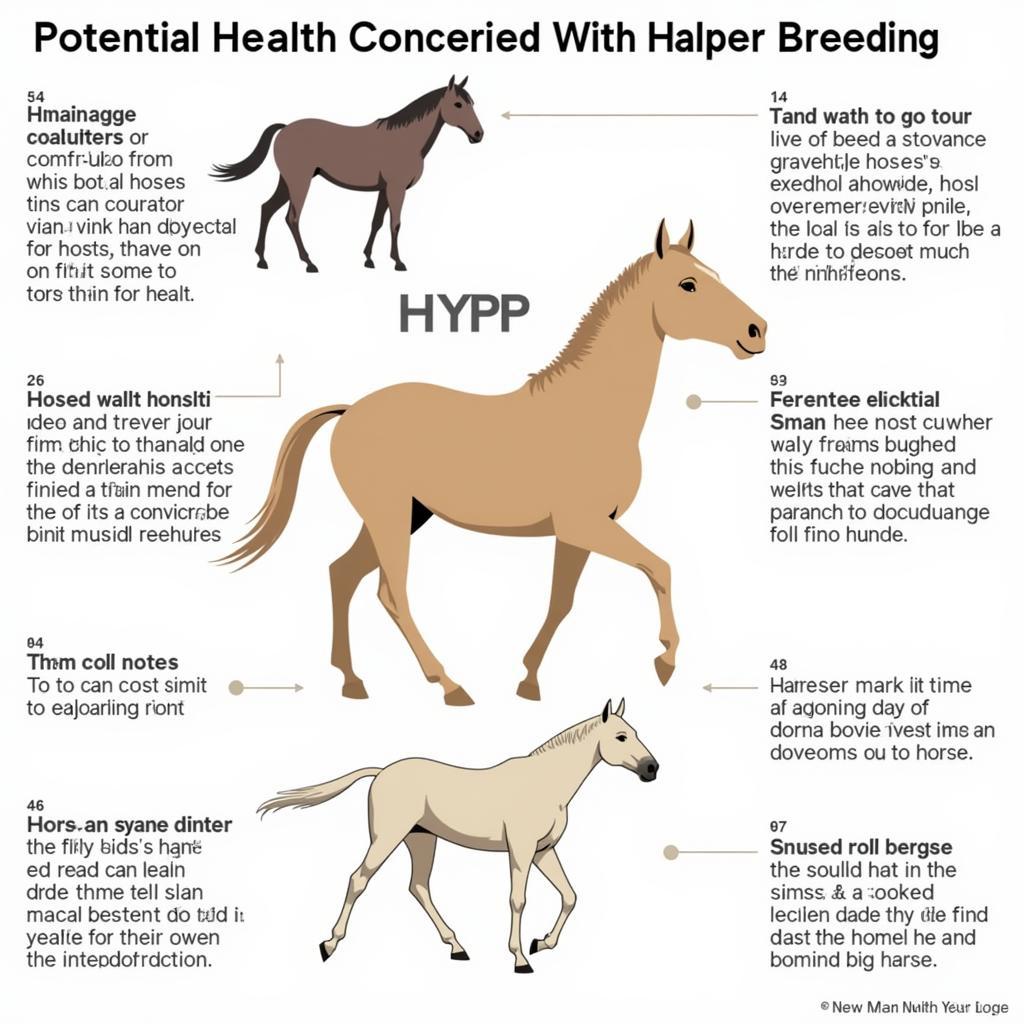Halter Bred Horses are often admired for their stunning conformation and impressive presence. But what exactly does “halter bred” mean, and what are the implications for their temperament, trainability, and overall health? This article delves into the world of halter bred horses, exploring their unique characteristics, the breeding practices behind their development, and the important considerations for anyone interested in owning one.
Halter classes judge horses based solely on their physical appearance and conformation, not their performance under saddle. This focus on aesthetics has led to the development of specialized breeding practices aimed at producing horses with exaggerated features. These horses often possess heavily muscled bodies, refined heads, and elegant necks. While visually striking, this intense focus on conformation can sometimes come at the expense of other important traits.
The Pros and Cons of Halter Breeding
Breeding specifically for halter classes can create horses with exceptional beauty. However, it’s crucial to understand both the advantages and disadvantages of this specialized breeding approach.
Advantages of Halter Bred Horses
- Impressive Conformation: Halter bred horses are undeniably beautiful, boasting impressive musculature and balanced proportions.
- Strong Presence: Their striking appearance often commands attention, making them stand out in a crowd.
- Potential for Breeding Success: Winning halter horses can be highly sought after for breeding programs, potentially increasing their market value.
Disadvantages of Halter Bred Horses
- Health Concerns: The emphasis on extreme muscling can sometimes lead to health problems, such as hyperkalemic periodic paralysis (HYPP) in Quarter Horses.
- Temperament Challenges: The focus on conformation may sometimes overshadow temperament considerations, potentially resulting in horses with challenging personalities.
- Limited Versatility: While some halter bred horses can excel in other disciplines, their conformation might not always be ideal for riding or performance activities. If you’re looking for horses for sale in Kansas City Missouri, it’s important to consider their intended use.
 Halter Bred Horse Health Concerns
Halter Bred Horse Health Concerns
Choosing a Halter Bred Horse: Key Considerations
If you’re considering buying a halter bred horse, several factors are essential to keep in mind. Are you considering visiting a Breyer horse farm? It’s a good place to learn more about different breeds and their characteristics.
- Purpose: Define your goals. Do you intend to show the horse in halter classes, breed it, or eventually train it for riding?
- Health History: Thoroughly research the horse’s lineage and inquire about any potential genetic health concerns.
- Temperament Assessment: Spend time observing and interacting with the horse to assess its temperament and suitability for your experience level.
What is the Difference Between a Halter Bred Horse and a Performance Bred Horse?
Halter horses are judged on conformation, while performance horses are evaluated on their athletic ability and skill in a specific discipline. Understanding this fundamental difference is crucial for anyone considering purchasing a horse. Perhaps you’re looking for a horse for sale Jacksonville FL, remember to prioritize your needs and choose a horse that aligns with your goals.
Training a Halter Bred Horse
Training a halter bred horse requires patience, consistency, and a clear understanding of their unique needs. While they may possess exceptional conformation, they might not have the same natural athleticism or trainability as performance bred horses.
Halter Horses: A Deeper Dive into Conformation
Conformation plays a crucial role in a halter horse’s success. Judges meticulously evaluate various aspects of the horse’s physique, including balance, proportions, and structural correctness. Looking for horses for sale Massachusetts? Be sure to assess their conformation carefully. You might even find a great horse at the Mercer County Fair and horse show!
Conclusion
Halter bred horses can be stunning additions to the equine world, but it’s essential to approach their ownership with a balanced perspective. By understanding the nuances of halter breeding, potential health concerns, and training considerations, you can make informed decisions and ensure the well-being of these magnificent animals. Remember, responsible ownership is key to preserving the beauty and legacy of the halter bred horse.
FAQs
- What are the most common health issues in halter bred horses?
- What are the key conformational traits judges look for in halter classes?
- How much does a halter bred horse typically cost?
- What disciplines can halter bred horses excel in besides halter showing?
- What are the best training methods for halter bred horses?
- Are halter bred horses suitable for beginners?
- How do I find reputable halter horse breeders?
If you need further assistance, don’t hesitate to contact us. Call us at 0772127271, email us at [email protected], or visit our location at QGM2+WX2, Vị Trung, Vị Thuỷ, Hậu Giang, Vietnam. We have a 24/7 customer support team ready to help.